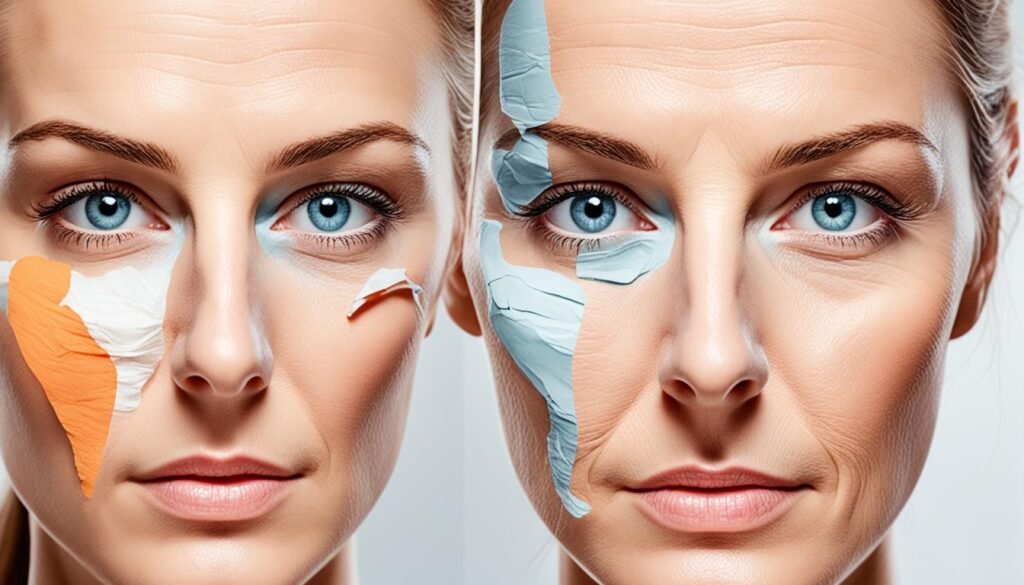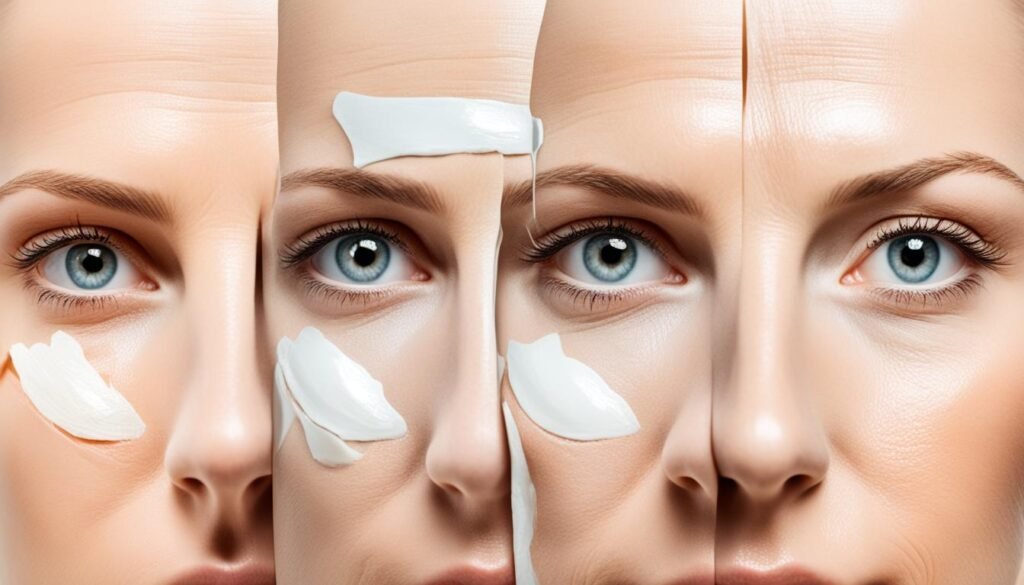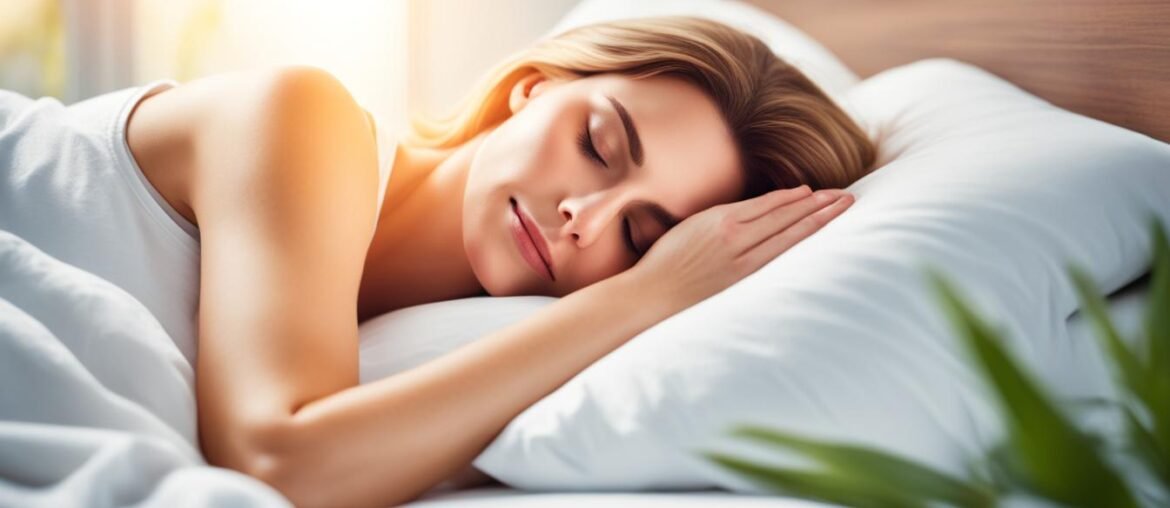Did you know that the quality of your sleep can have a direct impact on your skin health? It’s true! Science has revealed that getting enough high-quality sleep can lead to significant improvements in the appearance and overall health of your skin.
Sleep plays a crucial role in the maintenance and repair of the body, including processes that are essential for healthy skin. From muscle growth to cell rebuilding, hormone production, and brain function, the benefits of quality sleep extend far beyond feeling rested.
On the flip side, sleep deprivation can wreak havoc on your skin. It can lead to paler skin, the development of wrinkles, drooping eyelids, dark circles under the eyes, and even affect your psychological well-being and social interactions.
To support optimal skin health, it is recommended that adults get between seven and nine hours of sleep each day. By prioritizing sleep and making it a key part of your skincare routine, you can enhance your skin’s appearance and overall well-being.
Key Takeaways:
- Quality sleep is crucial for promoting skin health.
- Sleep deprivation can lead to various unwanted effects on the skin.
- Sleep plays a role in the maintenance and repair of the body, including processes vital for healthy skin.
- Getting between seven and nine hours of sleep each day is recommended for optimal skin health.
- Prioritizing sleep can enhance your skin’s appearance and overall well-being.
The Science Behind “Beauty Sleep”
While the phrase “beauty sleep” is commonly used, the scientific evidence behind its physical benefits is limited. Beauty and attractiveness are subjective concepts influenced by cultural and personal preferences. However, quality sleep is known to play a crucial role in maintaining and repairing the entire body.
During sleep, the body undergoes essential processes that contribute to physical well-being and appearance. These processes include growth hormone production, immune system function, brain pathway maintenance, and memory formation. Though the direct link between sleep and physical attractiveness is not well-defined, the impact of quality sleep on these underlying processes may indirectly influence a person’s physical appearance and self-perception of beauty.
While some studies have suggested certain physical benefits of quality sleep, such as a more youthful appearance and improved skin tone, it is important to note that these findings are not comprehensive or universally applicable. The nature of beauty is complex and influenced by various factors, including genetics, lifestyle, and personal preferences.
“While the scientific evidence supporting the concept of ‘beauty sleep’ may be limited, the importance of quality sleep for overall health and well-being cannot be overlooked.”
Therefore, although there is no direct scientific evidence linking sleep to physical beauty, ensuring adequate and quality sleep remains vital for overall health and optimal functioning of the body.
The Role of Sleep in Physical Appearance
While the science behind “beauty sleep” may be inconclusive, it is important to highlight the physical benefits of quality sleep that can indirectly influence a person’s appearance.
“Quality sleep promotes overall health, which can manifest in various ways, including a radiant complexion, reduced inflammation, and improved vitality.”
Moreover, sleep deprivation can contribute to a compromised immune system and increased inflammation, which can have negative effects on the skin’s appearance. By prioritizing quality sleep, individuals can optimize their overall health and enhance their physical appearance.
The Impact of Sleep on Physical Ageing
Aging is a natural process that affects everyone. However, certain lifestyle factors, including sleep quality and duration, can influence the rate at which aging manifests physically. While quality sleep cannot entirely prevent the natural aging process, it can support the body’s ability to repair and regenerate, potentially minimizing the visible signs of aging.
“Adequate sleep allows the body to engage in restorative processes, such as collagen synthesis and cellular repair, which may contribute to a more youthful appearance.”
Collagen, a protein responsible for maintaining skin elasticity, is primarily produced during sleep. Therefore, prioritizing quality sleep can potentially slow down the natural degradation of collagen, resulting in firmer and more youthful-looking skin.
| Sleep Duration | Physical Aging |
|---|---|
| Short sleep duration (less than 6 hours) | Accelerated skin aging, increased wrinkles, and reduced skin elasticity |
| Optimal sleep duration (7-9 hours) | Improved skin health, reduced signs of aging, and enhanced overall physical appearance |
| Long sleep duration (more than 9 hours) | Increased risk of skin issues, such as acne and dull complexion |
How Sleep Deprivation Can Affect Appearance

Sleep deprivation can have a significant impact on a person’s physical appearance. When we don’t get enough quality sleep, it can manifest in various ways, including visible changes in our skin and overall facial appearance.
The Effects on the Skin:
Sleep deprivation can cause the skin to appear paler than usual, as it reduces blood flow, resulting in a lack of natural radiance. Additionally, sleep deprivation can lead to the development of wrinkles and fine lines, particularly around the mouth area. These wrinkles can make a person’s face appear older and less vibrant.
Eye Appearance:
One of the most noticeable effects of sleep deprivation is its impact on the eyes. Lack of quality sleep can result in drooping or hanging eyelids, causing the eyes to appear tired and aged. Sleep-deprived individuals may also experience redness or swelling around the eyes, creating a fatigued and unhealthy appearance. Dark circles under the eyes are another common concern and can make a person look more tired and stressed.
These visible changes in appearance can have social implications as well. When we look tired and fatigued due to lack of sleep, others may perceive us as less attractive and approachable. It can affect our confidence and how we interact with others.
It is essential to prioritize quality sleep to mitigate these effects and promote a healthier and more youthful appearance.
The Potential Benefits of Beauty Sleep
Beauty sleep has the potential to provide remarkable benefits for the skin and overall appearance. Ensuring an adequate amount of quality sleep can significantly impact various aspects of our physical well-being, including skin health. Let’s explore some of the potential benefits that beauty sleep can offer:
Reducing Wrinkles with Sleep
Sleep can contribute to a reduction in wrinkles by supporting the production of collagen, a protein that maintains the skin’s elasticity and flexibility.
Clear Skin with Quality Sleep
Quality sleep plays a crucial role in regulating the behavior and repair of skin cells, including the repair of UV-damaged skin cells, leading to a clearer complexion.
Preventing Dark Circles with Sleep
While the impact of sleep on dark circles may be influenced by factors such as skin pigmentation and genetics, quality sleep can contribute to overall skin health and minimize the appearance of dark circles.
Improving Hair with Sleep
Quality sleep also plays a significant role in the overall health of our hair. It helps minimize excessive oil production and prevent hair loss, promoting hair growth and maintaining its lustrous appearance.
By prioritizing and optimizing our sleep patterns, we can harness these potential benefits for our skin and overall well-being. The next section will explore tips to help you get more beauty sleep.
Tips to Get More Beauty Sleep
To maximize the benefits of quality sleep for skin health, it is important to prioritize sleep hygiene and create a sleep-friendly environment. Here are some tips to help you get more beauty sleep:
Maintain a Regular Sleep Schedule
Establishing a consistent sleep schedule can help regulate your body’s internal clock and improve sleep quality. Try to go to bed and wake up at the same time every day, even on weekends.
Create a Sleep-Friendly Environment
Ensure that your sleep environment is quiet, dark, and cool. Use blackout curtains or an eye mask to block out light, and consider using earplugs or white noise machines to minimize noise disturbances. Keep your bedroom at a comfortable temperature to promote uninterrupted sleep.
Engage in a Wind-Down Routine
Develop a relaxing routine before bedtime to signal to your body that it’s time to sleep. This can include activities like taking a warm bath, practicing gentle stretching or yoga, or reading a book. Find what helps you unwind and make it a regular part of your evening routine.
Avoid Electronics Before Bedtime
Electronic devices emit blue light that can disrupt your sleep patterns. Try to avoid using screens like smartphones, tablets, and laptops at least an hour before bed. Instead, opt for calming activities that promote relaxation.
“Creating a sleep-friendly environment and establishing a regular sleep schedule can significantly improve the quality of your sleep.”
By implementing these tips, you can improve your sleep hygiene and enhance the benefits of quality sleep for your skin. Prioritizing a good night’s sleep will not only leave you feeling rested and rejuvenated but also promote healthier-looking skin.
The Impact of Sleep Deficiency on Skin Health

Sleep deficiency, characterized by insufficient or poor-quality sleep, can have detrimental effects on skin health. When we don’t get enough sleep or experience disruptions in sleep patterns, our skin suffers. Chronic sleep deprivation can worsen existing skin conditions such as acne, psoriasis, and atopic dermatitis. It can also contribute to skin dysfunction, premature aging, and other facial appearance problems.
During sleep, important processes occur that support skin homeostasis and overall health. Hormones are released, inflammation is regulated, and cellular repair takes place. Lack of sleep disrupts these processes, leading to imbalances that can manifest as skin-related clinical diseases.
One study published in the journal Sleep found that poor sleep quality was associated with increased signs of skin aging, including fine lines, uneven pigmentation, and reduced skin elasticity. Another study published in the Journal of Investigative Dermatology discovered that sleep deprivation alters the expression of genes essential for maintaining a healthy skin barrier.
| Skin Condition | Effects of Sleep Deficiency |
|---|---|
| Acne | Sleep deprivation can worsen acne by increasing inflammation and sebum production. |
| Psoriasis | Insufficient sleep can trigger psoriasis flare-ups and exacerbate the severity of the condition. |
| Atopic Dermatitis | Lack of sleep can lead to increased itching, redness, and inflammation in individuals with atopic dermatitis. |
| Premature Aging | Chronic sleep deficiency accelerates the aging process, leading to wrinkles and a dull complexion. |
It’s clear that sleep plays a crucial role in maintaining optimal skin health. To improve your skin, prioritize getting sufficient sleep and establish a consistent sleep routine. Creating a sleep-friendly environment and practicing good sleep hygiene can also help promote healthy skin.
The Role of Cortisol in Sleep and Skin Health
In the realm of sleep and skin health, cortisol, a hormone produced by the body, plays a crucial role. During sleep, cortisol levels naturally decrease, facilitating the body’s restorative processes. However, a lack of quality sleep can lead to elevated cortisol levels, which can have detrimental effects on the skin.
Elevated cortisol levels have been associated with impaired wound healing, as cortisol inhibits the formation of new blood vessels and collagen synthesis, essential components of the healing process. Moreover, high cortisol levels can promote early aging by breaking down collagen and elastin, resulting in the formation of fine lines and wrinkles.
Stress, often accompanied by increased cortisol production, has been linked to various skin conditions. Individuals with elevated cortisol levels may experience exacerbated symptoms of skin conditions such as psoriasis and slower wound healing.
The regulation of cortisol is crucial for maintaining skin health. To ensure optimal sleep and skin health, it is essential to address sources of stress, incorporate relaxation techniques into daily routines, and prioritize quality sleep.
Skincare Tips for Sleep-Induced Skin Benefits

Incorporating specific skincare tips into your nighttime routine can help maximize the skin benefits of quality sleep. Here are some actionable tips to enhance your sleep-induced skin health:
- Use an overnight moisturizer with hyaluronic acid: Hyaluronic acid is a powerful hydrating ingredient that can help replenish moisture in the skin while you sleep. Apply a moisturizer with hyaluronic acid before bedtime for a well-hydrated and glowing complexion.
- Opt for high-thread-count cotton sheets or silk pillowcases: Sleeping on smooth and soft materials like high-thread-count cotton or silk can minimize friction and reduce the risk of folding and wrinkling of the skin. These materials also help maintain better moisture retention in the skin.
- Choose products with vitamin C or vitamin A: Skincare products containing vitamin C or vitamin A can support collagen production, improve skin texture, and provide antioxidant protection. Incorporate serums or creams with these ingredients into your nighttime skincare routine for healthy, radiant skin.
- Use a humidifier in the bedroom: Dry air can dehydrate the skin, causing dryness and dullness. By using a humidifier in your bedroom, you can add moisture to the air, keeping your skin hydrated and preventing dryness while you sleep.
- Try sleeping on your back: Sleeping on your back can prevent facial contact with the pillow and reduce the likelihood of sleep lines and temporary swelling. This sleeping position can help maintain the integrity of your skin and minimize the formation of sleep-related wrinkles.
Incorporating these simple skincare tips into your nighttime routine can contribute to healthier, more radiant skin. Remember, optimizing your sleep environment and using the right skincare products can enhance the skin benefits of quality sleep.
The Link Between Sleep and Collagen Production

Collagen, a protein responsible for maintaining the skin’s elasticity and firmness, is closely linked to sleep. Traditionally, cell turnover and collagen production increase in the evening, making uninterrupted sleep crucial for optimal collagen production. Sleep disturbances can disrupt collagen production, leading to decreased firmness and a less youthful appearance. Adequate sleep is essential for supporting collagen production and maintaining skin health.
During sleep, our body goes through various restorative processes, including the production of collagen. Collagen is a protein that provides structural support to our skin, keeping it firm, elastic, and youthful-looking. When we sleep, our body repairs and rebuilds damaged collagen fibers, replenishing and strengthening the skin’s foundation.
Daily stressors, environmental factors, and aging can accelerate collagen breakdown, leading to wrinkles, fine lines, and sagging skin. That’s why quality sleep is crucial for collagen production, as it allows the body to replenish and restore collagen levels naturally. Without sufficient sleep, collagen production may be compromised, resulting in decreased skin firmness and an increased likelihood of premature aging.
The effect of sleep on collagen production is particularly significant as we age. As we get older, the natural production of collagen decreases, making it even more important to prioritize quality sleep for optimal skin health. By ensuring adequate sleep, we can help maintain the skin’s structural integrity, reduce the signs of aging, and promote a more youthful appearance.
In addition to collagen, sleep also plays a vital role in maintaining overall skin health. When we sleep, our body’s natural healing and regeneration processes are at work, repairing damage caused by UV radiation, pollution, and other external stressors. Quality sleep helps to regulate inflammation, supports proper hydration of the skin, and improves overall skin barrier function.
It is important to prioritize sleep and establish healthy sleep habits to support collagen production and overall skin health. By getting enough quality sleep, practicing good sleep hygiene, and creating a sleep-friendly environment, we can optimize collagen production, enhance skin firmness, and promote a more vibrant, youthful complexion.
The Effect of Sleep on Skin Firmness
One of the key benefits of quality sleep is its positive impact on skin firmness. Collagen, as mentioned earlier, plays a crucial role in maintaining the skin’s elasticity and firmness. It provides structural support to the skin, preventing sagging and wrinkles.
During sleep, the body releases growth hormones that stimulate collagen production. These hormones help repair and rebuild collagen fibers, improving the skin’s firmness and resilience. On the other hand, sleep deprivation can disrupt the release of growth hormones, hindering collagen production and leading to a loss of skin firmness.
Research has shown that sleep-deprived individuals have lower levels of collagen and elastin, two proteins responsible for maintaining the skin’s structure and elasticity. This can result in a dull, sagging complexion and an increased likelihood of developing wrinkles and fine lines.
“Lack of sleep can lead to decreased collagen production, resulting in a loss of skin firmness and the development of wrinkles and fine lines.”
By prioritizing quality sleep and ensuring sufficient sleep duration, we can support collagen production and promote skin firmness. Establishing a regular sleep schedule, creating a relaxing bedtime routine, and minimizing sleep disturbances can all contribute to better skin health and a more youthful appearance.
Sleep and Aging
Aging is a natural process that affects our skin’s appearance and quality. As we age, our body’s natural production of collagen and other essential proteins decreases. This leads to thinning, sagging skin and an increased susceptibility to wrinkles and fine lines.
While we cannot completely reverse the effects of aging, optimizing our sleep habits can help slow down the aging process and maintain healthier, more youthful-looking skin. Quality sleep promotes collagen production, which in turn improves skin elasticity and reduces the signs of aging.
During deep sleep, the body enters a state of repair and regeneration. This is when collagen production and cell turnover are at their peak. By consistently getting enough quality sleep, we can support these natural restorative processes and minimize the visible signs of aging.
In contrast, sleep deprivation and poor sleep quality can accelerate the aging process. When we don’t get enough sleep, our body produces more cortisol, also known as the stress hormone. Elevated cortisol levels can lead to collagen breakdown and a decrease in skin elasticity, resulting in the premature development of wrinkles and fine lines.
Moreover, chronic sleep deprivation can impair the skin’s ability to recover from environmental damage, making it more susceptible to the effects of sun exposure and pollution. This can further accelerate skin aging and lead to the development of age spots, uneven skin tone, and other signs of premature aging.
By prioritizing sleep and adopting healthy sleep habits, we can slow down the aging process, maintain better skin health, and enjoy a more youthful appearance for longer.
The Impact of Sleep on Skin Barrier Function

Sleep plays a significant role in regulating the function and behavior of the skin’s natural barrier. The body’s internal clock, known as the circadian rhythm, influences various skin processes, including thermoregulation and repair. During sleep, the skin experiences increased blood flow, allowing for better nutrient delivery and waste removal. Repair processes, such as collagen synthesis and cell regeneration, are also heightened during this time.
One important aspect of skin barrier function is the regulation of UV sunlight-damaged skin cells. Sleep helps restore and repair these cells, promoting a healthier complexion and preventing further skin damage.
However, sleep deprivation and irregular sleep patterns can have detrimental effects on the skin’s barrier function. Late bedtimes and insufficient sleep can lead to skin dehydration, as the natural moisture balance of the skin is disrupted. This can result in peeling, dryness, and increased water loss from the skin.
Additionally, sleep deprivation can contribute to an increase in oily secretions by stimulating the production of sebum, the skin’s natural oil. This can lead to clogged pores and the development of acne.
To support optimal skin barrier function, it is crucial to maintain a regular sleep pattern and prioritize sleep. Establishing a consistent bedtime routine and creating a sleep-friendly environment can help improve sleep quality and promote healthy skin. Adequate hydration and the use of moisturizers can also help combat skin dehydration caused by sleep deprivation.
| Sleep Impact | Effect on Skin Barrier Function |
|---|---|
| Sleep deprivation | Disruption of natural moisture balance, leading to skin dehydration |
| Irregular sleep patterns | Increased water loss from the skin |
| Sleep deprivation | Stimulation of sebum production, leading to increased oily secretions |
The Role of Plant Extracts in Promoting Sleep and Skin Health

Plant extracts have gained recognition for their potential to promote sleep and support skin health. These extracts contain bioactive compounds that can have sleep-promoting effects and contribute to overall skin well-being.
One mechanism through which certain plant extracts promote sleep is by regulating the GABAergic system. Gamma-aminobutyric acid (GABA) is a neurotransmitter that helps calm the nervous system and promotes relaxation. Plant extracts with GABAergic properties can enhance sleep quality and improve sleep duration.
Moreover, the oral application of sleep-promoting plant extracts has shown promise in both health foods and cosmetic products. Sleep-promoting health foods enriched with plant extracts can provide a natural and holistic approach to improving sleep quality. These foods can include herbal teas, dietary supplements, and functional beverages formulated with plant extracts known for their relaxing properties.
Additionally, plant extracts are being explored for their potential use in sleep-mediated cosmetics. These cosmetic products aim to optimize sleep-induced skin benefits, leveraging the power of plant extracts to enhance skin health. By incorporating bioactive plant extracts, such as lavender or chamomile, into skincare formulations, these products may promote relaxation, improve sleep quality, and contribute to healthier-looking skin.
Further research and exploration of plant extracts for sleep and skin health are crucial for the development of innovative sleep-mediated cosmetic products. By harnessing the power of these natural ingredients, we can unlock new possibilities to support both quality sleep and vibrant skin.
Conclusion
Optimizing sleep is crucial for maintaining healthy skin. Scientific evidence supports the physical benefits of quality sleep for the skin, highlighting the importance of prioritizing sleep for improved skin health. Sleep deprivation can lead to undesirable effects such as wrinkles, dullness, dehydration, and acne, negatively impacting the complexion. However, by implementing sleep hygiene practices, creating a sleep-friendly environment, and incorporating skincare routines that support sleep-induced skin benefits, it is possible to optimize sleep for a more vibrant and healthy complexion.
Quality sleep plays a significant role in the maintenance and repair of the body, including processes that support skin health. Prioritizing between seven and nine hours of sleep each day can promote optimal skin rejuvenation and help prevent the signs of aging. By establishing a consistent sleep schedule, creating a calm and comfortable sleep environment, and utilizing skincare products and techniques that enhance the benefits of sleep, individuals can unlock the full potential of quality sleep for their skin.
In conclusion, the relationship between sleep and skin health is undeniable. Investing in sufficient and restful sleep is a worthwhile endeavor, as it contributes to a more youthful, radiant, and healthy complexion. By embracing the power of quality sleep, individuals can optimize their skincare routines and experience the ultimate skin benefits that come with a well-rested body and mind.
FAQ
What is the role of quality sleep in promoting skin health?
Quality sleep plays a crucial role in promoting skin health. It contributes to the maintenance and repair of the body, including processes such as muscle growth, cell rebuilding, hormone production, and brain function. Sleep deprivation can lead to various unwanted effects on the skin, such as wrinkles, dullness, and dehydration.
Is there scientific evidence behind the concept of “beauty sleep”?
While the concept of “beauty sleep” may be subjective, there is scientific evidence that supports the physical benefits of quality sleep for the skin. Sleep plays a role in collagen production, regulation of skin cells, and repair processes, which can contribute to a healthy and vibrant complexion.
How does sleep deprivation affect a person’s physical appearance?
Sleep deprivation can have negative effects on a person’s physical appearance. It can cause the skin to appear paler, with the development of wrinkles, hanging corners of the mouth, drooping or hanging eyelids, red or swollen eyes, and dark circles under the eyes. Sleep-deprived individuals may also appear sadder and more fatigued, leading to perceptions of unattractiveness.
What are the potential benefits of quality sleep for the skin?
Quality sleep can contribute to reducing wrinkles by supporting collagen production and maintaining skin elasticity. It can also help maintain a clear complexion by regulating the behavior and repair of skin cells. While the impact on dark circles may be limited, quality sleep plays a significant role in overall hair health, minimizing oil production, and preventing hair loss.
What are some tips to get more beauty sleep?
To get more beauty sleep, it is important to prioritize sleep hygiene. This includes maintaining a regular sleep schedule, creating a sleep-friendly environment by minimizing distractions and light, and engaging in a calming wind-down routine before bed. Avoiding electronics and screens before bedtime is also recommended.
How does sleep deficiency affect skin health?
Sleep deficiency, characterized by insufficient or poor-quality sleep, can have detrimental effects on skin health. It can exacerbate existing skin conditions such as acne, psoriasis, and atopic dermatitis. Sleep disturbances disrupt important hormones and pathways related to skin homeostasis, leading to imbalances that can manifest as skin-related clinical diseases.
What is the role of cortisol in sleep and skin health?
Cortisol, a hormone produced by the body, plays a vital role in sleep and skin health. Elevated cortisol levels, often associated with stress and a lack of quality sleep, can interfere with wound healing, promote early aging, and contribute to acne flares. The regulation of cortisol is crucial for maintaining skin health.
Are there specific skincare tips for maximizing sleep-induced skin benefits?
Yes, there are specific skincare tips for maximizing sleep-induced skin benefits. Using an overnight moisturizer with ingredients like hyaluronic acid can help hydrate the skin. Opting for high-thread-count cotton sheets or silk pillowcases can minimize friction and reduce folding and wrinkling of the skin. Choosing skincare products with ingredients like vitamin C or vitamin A can support collagen production and improve skin health. Using a humidifier in the bedroom can help counteract the drying effects of sleep, and sleeping on the back can prevent facial contact with the pillow, reducing sleep lines and temporary swelling.
How does sleep impact collagen production?
Sleep plays a significant role in regulating collagen production. During sleep, cell turnover and collagen production increase, supporting the skin’s elasticity and firmness. Sleep disturbances can disrupt collagen production, leading to decreased firmness and a less youthful appearance. Adequate sleep is essential for supporting collagen production and maintaining skin health.
How does sleep impact skin barrier function?
Sleep plays a significant role in regulating skin barrier function and behavior. The circadian rhythm, the body’s internal clock, influences various skin functions, including thermoregulation and repair. Sleep deprivation and late bedtimes can lead to undesirable changes in skin complexion, such as dehydration, increased water loss, and increased oily secretions. These changes can contribute to skin issues like acne. Maintaining a regular sleep pattern and prioritizing sleep can help support optimal skin barrier function.
What is the role of plant extracts in promoting sleep and skin health?
Certain plant extracts have sleep-promoting effects and can contribute to improving sleep quality. These extracts can act through mechanisms such as GABAergic regulation. The oral application of sleep-promoting plant extracts in the form of health foods or cosmetic products shows promise in enhancing sleep quality and skin health.
How does optimizing sleep contribute to skin health?
By prioritizing quality sleep, it is possible to optimize sleep for improved skin health. Quality sleep supports collagen production, skin repair processes, and the regulation of skin cells. This can lead to a more vibrant and healthy complexion.




